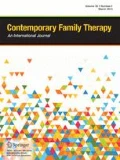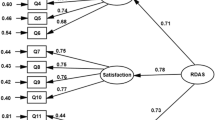Abstract
This study was conducted to determine the effect of solution-focused level on marital disaffection and sexual satisfaction in married individuals. The descriptive and cross-sectional study was conducted between the dates of 11.20.2020–01.05.2021 with 336 married individuals who accepted to participate in the study. The data were collected using the Personal Information Form, the Solution Focused Inventory, the Marital Disaffection Scale and the New Sexual Satisfaction Scale. In the evaluation of the data, Mann–Whitney, Kruskal Wallis, correlation and regression tests were used as well as the descriptive statistics. The ethics committee’s permission and the written consent of the participants were obtained to execute the study. The Solution Focused Inventory total mean score of the married individuals was 45.62 ± 12.82; The mean score of the Marital Disaffection Scale was 36.50 ± 12.57, and the total mean score for the New Sexual Satisfaction Scale was 71.24 ± 19.33. While there was a negative correlation between the Solution Focused Inventory and the Marital Disaffection Scale; A positive correlation was determined between the Solution Focused Inventory and the New Sexual Satisfaction Scale. It has been determined that as the solution-focused level of married women increased, their marital disaffection decreased and their sexual satisfaction enhanced.
Similar content being viewed by others
Data Availability
Not applicable.
Code Availability
Not applicable.
References
Abbasi, A., Mohammadi, M., Zahrakar, K., Davarniya, R., & Babaeigarmkhani, M. (2017). Effectiveness of solution-focused brief therapy (SFBT) on reducing depression and ıncreasing marital satisfaction in married women. Iran Journal of Nursing, 30(105), 34–46. https://doi.org/10.29252/ijn.30.105.34
Abusaidi, E., Zahrakar, K., & Mohsenzadeh, F. (2018). Effect of solution-focused brief couple therapy in improvement of communication patterns and marital intimacy in women. Journal of Research & Health Social Development & Health Promotion Research Center, 8(6), 555–564. https://doi.org/10.29252/jrh.8.6.555
Arif, N., & Fatima, I. (2015). Marital satisfaction in different types of marriage. Pakistan Journal of Social and Clinical Psychology, 13(1), 36–40.
Asfajir, A. A. A., & Ramezani, L. (2017). There relationship between family function and marital satisfaction with marital disaffection of married teachers in Behshahr. Sociological Studies of Youth, 7(24), 9–22.
Badakhshan, R. A. (2015). The effectiveness of solution- focused brief group therapy on the reduce marital burnout in men. Indian Journal of Fundamental and Applied Life Sciences, 5(S3), 1156–1162.
Bagheri, S., Asadi, J., & Khajevand Khoshli, A. (2019). The effect of solution-focused couple therapy on communication patterns and flexibility in divorce applicant couples. Avicenna Journal of Neuro Psycho Physiology, 6(3), 133–140. https://doi.org/10.32598/ajnpp.6.3.200.1
Bal, F., Faraji, H., & Erdinç, İ. (2018). Yaşam doyumunu etkileyen faktörlerin evlilik ve cinsellik kavramı üzerinden değerlendirilmesi. Sosyal Bilimler Dergisi, 5(30), 185–197. https://doi.org/10.16990/SOBIDER.4564
Baygül, Ş, & Avcı, R. (2016). Çözüm odaklı kısa süreli aile danışmanlığı kuramına dayalı olarak geliştirilen evlilik programının çiftlerin evlilik uyumlarını artırmadaki etkisi. Mustafa Kemal Üniversitesi Sosyal Bilimler Enstitüsü Dergisi, 13(36), 114–129.
Bilgin, R. (2016). Geleneksel ve modern toplumda kadın bedeni ve cinselliği. Fırat Üniversitesi Sosyal Bilimler Dergisi, 26(1), 219–243. https://doi.org/10.18069/fusbed.43256
Bozkurt, Ö. D., & Sevil, Ü. (2016). Menopoz Ve Cinsel Yaşam. CBU-SBED, 3(4), 497–503.
Çağ, P., & Yıldırım, İ. (2013). Evlilik doyumunu yordayan ilişkisel ve kişisel değişkenler. Türk Psikolojik Danışma Ve Rehberlik Dergisi, 4(39), 13–23.
Çelik, E. (2013). Evlilik hoşnutsuzluğu ölçeğinin Türkçeye uyarlanması: Geçerlik ve güvenirlik çalışması. Turkish Studies – International Periodical For The Languages, Literature and History of Turkishor Turkic, 8(12), 249–261.
Çolak, A. M., & Cin, F. M. (2019). Kadınların cinsel doyumunun ilişki mutlulukları üzerine etkisi. İstanbul Ticaret Üniversitesi Sosyal Bilimler Dergisi, 18(35), 745–754.
Davarniya, R., Zahrakar, K., & Nazari, A. M. (2018). The effectiveness of brief solution-focused couple therapy (BSFCT) on reducing couple burnout. Journal of Research & Health Social Development & Health Promotion Research Center, 8(2), 123–131. https://doi.org/10.29252/jrh.8.2.123
Dogan, T., Turgut, N., & Golbasi, Z. (2013). The relationship between sexual quality of life, happiness, and satisfaction with life in married Turkish women. Sexuality and Disability, 31, 239–247. https://doi.org/10.1007/s11195-013-9302-z
Dorche, P. K., Kimiaei, S. A., & Ghahramanzadeh, M. (2017). Evaluating the effect of solution-focused group counseling on ımproving quality of marital relationships in childless couples. International Journal of Psychological Studies, 9(1), 81–87. https://doi.org/10.5539/ijps.v9n1p81
Duba, J. D., Hughey, A. W., Lara, T., & Burke, M. G. (2012). Areas of marital dissatisfaction among long-term couples. Adultspan Journal, 11(1), 39–54. https://doi.org/10.1002/j.2161-0029.2012.00004.x
Faizal, A. S., Sidi, H., Wahab, S., Drph, L. S., Zin, N. M., & Baharuddin, N. (2017). Assessment of marital dissatisfaction and ıts association with sexual dysfunction and psychiatric morbidities among primary health attenders in Malaysia. International Medical Journal Malaysia, 16(2), 19–26. https://doi.org/10.31436/imjm.v16i2.320
Grant, A. M., Cavanagh, M. J., Kleitman, S., Spence, G., Lakota, M., & Yu, N. (2012). Development and validation of the solution-focused in ventory. The Journal of Positive Psychology, 7(4), 334–348. https://doi.org/10.1080/17439760.2012.697184
Haylı, R. G., Durmuş, E., & Kış, A. (2017). Evlilik doyumunun evlenme biçimi açısından incelenmesi: bir meta-analiz çalışması. International Periodical for the Languages, Literature and History of Turkish or Turkic, 12(28), 429–444. https://doi.org/10.7827/TurkishStudies.12694
Ikechukwu Ilo, C. (2014). Perception of contributory factors to marital sexual satisfaction among married persons in Ebonyi State University, Abakaliki, Nigeria: Implications for Family Health. Journal of Community Medicine and Health Education, 4(5), 1–6. https://doi.org/10.4172/2161-0711.1000313
Jenaban, Z., Refahei, Z., & Ghaderi, Z. (2014). The effectiveness of short-term solution-focused couples therapy in ıncreasing different dimensions of couples’ problem solving ability. Journal of Novel Applied Science, 3(2), 209–214.
Kamali, Z., Allahyar, N., Ostovar, S., Alhabshi, S. M. S. S. M., Griffiths, M. D., & Caputa, M. (2020). Factors that influence marital intimacy: A qualitative analysis of Iranian married couples. Cogent Psychology, 7(1), 1771118. https://doi.org/10.1080/23311908.2020.1771118
Karahan, F. Ş, Bakalım, O., & Yoleri, S. (2017). Solution focused thinking and empathy in education faculty students. Journal of Human Sciences, 14(4), 4383–4392. https://doi.org/10.14687/jhs.v14i4.5024
Karahan-Şanal, F., & Hamarta, E. (2015). Çözüm odaklı envanter: Güvenirlik ve geçerlik çalışması. İlköğretim Online, 14(2), 757–769. https://doi.org/10.17051/io.2015.15313
Karasu, F., Göllüce, A., Güvenç, E., & Çelik, S. (2017). The attitudes of the university students’ regarding the gender roles. SDU Journal of Health Sciences Institute, 8(1), 21–27. https://doi.org/10.22312/sdusbed.303098
Kayser, K. (1993). When love dies: The process of marital disaffection. Guilford Press.
Kayser, K. (1996). The marital disaffection scale: An inventory for assessing emotional estrangement in marriage. The American Journal of Family Therapy, 24(1), 83–88. https://doi.org/10.1080/01926189508251019
Kayser, K., & Rao, S. S. (2006). Process of disaffection in relationship breakdown. In M. A. Fine & J. H. Harvey (Eds.), Handbook of divorce and relationship dissolution (pp. 201–221). Lawrence Erlbaum.
Kim, J. S., Akin, B. A., & Brook, J. (2019). Solution-focused brief therapy to improve child well-being and family functioning outcomes with substance using parents in the child welfare system. Developmental Child Welfare, 1(2), 124–142. https://doi.org/10.1177/2516103219829479
Komaei, F., & Sedaghatİfard, M. (2016). Investigating on the relationship between sexual dysfunction in women with marital disaffection. Journal of Analytical-Cognitive Psychology, 6(23), 55–49.
Kumcağız, H., & Ertuğ, K. (2016). Evlilik hoşnutsuzluğu ile sosyodemografik özellikler arasındaki ilişki. Turkish Studies: International Periodical for the Languages, Literature and History of Turkishor Turkic, 11(19), 601–620. https://doi.org/10.7827/TurkishStudies.9780
Lawrance, K., & Byers, E. S. (1995). Sexual satisfaction in long-term heterosexual relationships: The Interpersonal Exchange Model of Sexual Satisfaction. Personal Relationships, 2(4), 267–285. https://doi.org/10.1111/j.1475-6811.1995.tb00092.x
Mahmudi, M. J., Sanai, B., Nazari, A. M., Davarniya, R., Bakhtiari, S. B., & Shakarami, M. (2015). The effectıveness of solutıon-focused brıef therapy (sfbt) on reducıng couple burnout and ımprovement of the qualıty of lıfe of marrıed women. Armaghane-Danesh, Yasuj University of Medical Sciences Journal, 20(5), 416–432.
Mirzavand, A., Riahi, M., Mirzavand, A., & Malekitabar, M. (2016). Effectiveness of solution-focused therapy on married couples’ burnout. Iranian Journal of Psychiatry and Behavioural Science, 10(4), e4983. https://doi.org/10.17795/ijpbs-4983
Monemiyan, G., Khoshkonesh, A., & Poorebrahim, T. (2016). Effectiveness of solution-focused brief therapy on the reduction of couple burnout and optimizing the quality of marital relationship in married women. Feyz, Journal of Kashan University of Medical Sciences., 20(2), 165–172.
Nazlı, S. (2014). Aile danışmanlığı. Anı Yayıncılık.
Özgüven, İ. E. (2014). Evlilik ve aile terapisi. Nobel Akademik Yayıncılık.
Saeidi, L. (2006). The effectiveness of brief solution-focused approach on couples’ conflict decrease. New Research Consultants, 20, 35.
Scott, V. C., Sandberg, J. G., Harper, J. M., & Miller, R. B. (2012). The impact of depressive symptoms and health on sexual satisfaction for older couples: Implications for clinicians. Contemporary Family Therapy: An International Journal, 34(3), 376–390. https://doi.org/10.1007/s10591-012-9198-2
Shahsiah, M. (2015). A survey of the effect of brief solution-focused approach on reduction of marital conflicts. Journal of Human Health, 1(3), 67–71.
Shirashiani, A., & Namani, E. (2017). Effectiveness of the combination of solution-focused therapy and narrative therapy in marital adjustment among ıncompatible Iranian women. Open Journal of Psychiatry, 7(2), 79–89. https://doi.org/10.4236/ojpsych.2017.72008
Sinanoğlu, C. (2019). Evliliklerinden Hoşnut Olan ve Olmayan Bireylerin Depresyon Düzeyleri ve İntihar Olasılıklarının Karşılaştırılması. Sosyal Bilimler Enstitüsü, Klinik Psikoloji Anabilim Dalı, Yüksek Lisans Tezi, Yakın Doğu Üniversitesi.
Stulhofer, A., Busko, V., & Brouillard, P. (2010). Development and bicultural validation of the new sexual satisfaction scale. The Journal of Sex Research, 47(4), 257–268. https://doi.org/10.1080/00224490903100561
Sultana, A., & Altay, S. (2019). Ataerkillik ve kadının ikincilliği; kuramsal bir analiz. e-Şarkiyat İlmi Araştırmalar Dergisi, 11(1), 417–427.
Tuğut, N. (2016). Yeni Cinsel Doyum ölçeğinin Türkçe versiyonu: Geçerlik ve güvenirlik çalışması. The Journal of Happiness & Well-Being, 4(2), 183–195.
Üçgül, Ş. (2019). Evlilik beklentisinin ve evlenme türlerinin evlilik hoşnutsuzluğuna etkisi: Konya örneği. Sosyal Bilimler Enstitüsü Aile Danışmanlığı ve Eğitimi Anabilim Dalı, Yüksek Lisans Tezi, Selçuk Üniversitesi.
Westman, M., Vinokur, A. D., Hamilton, V. L., & Roziner, I. (2004). Crossover of marital dissatisfaction during military down / sizing among russian army officers. Journal of Applied Psychology, 89(5), 769–779. https://doi.org/10.1037/0021-9010.89.5.769
Yalçın, H. (2014). Evlilik uyumu ile sosyodemografik özellikler arasındaki ilişki. Eğitim Ve Öğretim Araştırmaları Dergisi, 3(1), 250–261.
Yavuzer, H., Baltaş, Z., Baltaş, A., Konuk, E., Köknel, Ö., Razon, N., & Navaro, L. (2003). Ana-baba okulu. Remzi Kitabevi.
Acknowledgements
We are grateful to all the individuals who participated in the study.
Funding
During the present study, no financial support was received from institutions or organizations.
Author information
Authors and Affiliations
Contributions
Study conception and design: FK, DA, EÖÇ. Data collection: FK, DA, EÖÇ. Data analysis and interpretation: FK. Drafting of the article: FK, DA, EÖÇ. Critical revision of the article: FK, DA, EÖÇ.
Corresponding author
Ethics declarations
Conflict of interest
There is no conflict of interest between the authors and/or family members regarding this study.
Ethical Approval and Consent to Participate
Ethical approval was obtained from the Ethics Committee (Ethics Committee No: 2020/22). Written consent was obtained from the patients to conduct the study.
Additional information
Publisher's Note
Springer Nature remains neutral with regard to jurisdictional claims in published maps and institutional affiliations.
Rights and permissions
About this article
Cite this article
Karasu, F., Ayar, D. & Çopur, E.Ö. The Effect of Solution Focused Level on Marital Disaffection and Sexual Satisfaction in Married Individuals. Contemp Fam Ther 45, 75–84 (2023). https://doi.org/10.1007/s10591-021-09590-w
Accepted:
Published:
Issue Date:
DOI: https://doi.org/10.1007/s10591-021-09590-w



